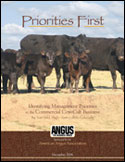BQA Program Spans Pasture to Processing
K-State connects beef producers with online training resources.
A series of online videos, hosted by Kansas State University (K-State), can help beef producers and processors keep pace with changes in most every step of the production cycle.
As part of its Beef Quality Assurance (BQA) Program, K-State's Beef Cattle Institute has expanded to an additional website, "Animal Care Training." The BQA Program is a training system for beef producers, handlers and processors.
Dan Thomson, an associate professor in the Department of Clinical Sciences in K-State's College of Veterinary Medicine and director of K-State's Beef Cattle Institute (BCI), said the program fills gaps created by dwindling resources and educates workers in all sectors of the beef industry, from the newly hired to the seasoned veteran.
"We're running low on people, time and opportunities for face-to-face meetings to actually carry out some of this training," Thomson says. To augment this face-to-face or on-the-job training, the BCI has produced a series of about 150 online training modules that are each 5-10 minutes in length.
The program is entirely self-paced — participants can log in and watch videos as many times as they like, 24 hours a day. Topics covered in the training modules — which are available in English and in Spanish — continue to evolve as participants return to the site seeking further training, he explains.
"We've seen an evolution in BQA from 'How do we move our injection sites to the neck?' to 'How do we make sure that we use our animal microbials in a proper manner?' " Thomson says. "It's not only what the product is and how wholesome the product is, but now we have to look at how we actually raise these animals."
To access modules, visit the BCI website and select "Animal Care Training" in the lower right corner of the screen. Payment for the modules can be made with a credit card, or an invoice can be mailed to the subscriber.
Each module ends with a short quiz. At least 80% of the questions must be answered correctly for a passing grade. The subscriber will then be e-mailed a certificate with his or her name on it to document completion of that module.
"Not only do we maintain that diploma for them, electronically," says Thomson, "but we also develop a transcript for each employee or producer [who] wants to take part in this."
He added that the online modules convey ideas and techniques that books and other printed materials can't adequately demonstrate.
"I'm not a very good learner from just reading a book," Thomson says. Being able to see it and hear the information provides a more effective way to train.
 Thomson says online delivery saves time and money for both teacher and students. Trainers don't have to spend money on travel or on renting facilities and equipment at the training site; students don't have to postpone important duties at the ranch or farm, or spend money on travel and lodging near the training site.
Thomson says online delivery saves time and money for both teacher and students. Trainers don't have to spend money on travel or on renting facilities and equipment at the training site; students don't have to postpone important duties at the ranch or farm, or spend money on travel and lodging near the training site.
The industry is taking notice of the BQA program. The National Cattlemen's Beef Association has designated the BCI as its national center for online training.
While the focus of the BQA program is beef cattle, the site also includes training modules for dairy cattle and equine care.




